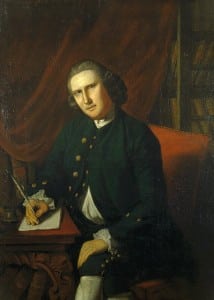Samuel Chase (17 April 1741 – June 19, 1811) served as a delegate from Maryland during the Second Continental Congress. After the American Revolutionary War, George Washington appointed him as an Associate Justice of the United States Supreme Court.

During his tenure, he was accused of being a partisan by the Jeffersonian Democratic-Republican, and they moved to impeach him. Chase was acquitted by the Senate.
During his time at the Second Continental Congress, he served alongside fellow Maryland delegates: Charles Carroll of Carrollton, Thomas Stone, and his close friend William Paca. He and Paca also organized a chapter of the Sons of Liberty in Maryland.
Youth and early career
Samuel Chase was born near Princess Anne, Maryland, to his father, Thomas Chase, and his mother, Matilda Walker. His father was an immigrant who served as a priest.
Clergy were typically some of the most educated men in the 13 original colonies, which allowed Samuel to be educated at home. After receiving his primary education, Chase studied law under John Hall in Annapolis.
He was admitted to the bar in 1761 and set up a practice in Annapolis. During this time, he came into contact with his close friend William Paca.
He married Ann Baldwin in May of 1762 and went on to have seven children, with only four surviving until adulthood.
His beloved wife would pass away in 1776, around the same time that Chase signed the Declaration of Independence. He would not remarry until after the American Revolutionary War. In 1784, during a trip to England, he met Hannah Kilty. The two married and gave birth to two daughters.
Career in Annapolis
Samuel Chase would be a controversial character throughout his life and reminds one a bit of Samuel Adams with his zeal.
Chase was expelled from the Forensic Club for "extremely irregular and indecent" behavior. Four years later, he entered into a conflict with many Tories.
The Tories accused Chase of being "a busy, reckless incendiary of mobs, a foul-mouthed and inflaming son of discord and faction, a common disturber of the public tranquility." Nevertheless, Chase remained an influential voice in Maryland politics.
He and William Paca would organize a local chapter of the Sons of Liberty in Annapolis.
However, like many Revolutionary War patriots, Samuel Chase's notoriety rose during the Stamp Act. He was Maryland's leading voice in opposition to the British tax.
From here, he would serve as a member of the Annapolis Convention and would be selected to be a delegate to the Continental Congress. Here, he would sign the Declaration of Independence.
Unfortunately, in 1778, Samuel Chase made a few shady business decisions that would harm his reputation.
He attempted, through insider trading, to corner the flower market. He was found out and would not return to the Continental Congress for the duration of the war.
Presidential Appointment and Impeachment
President George Washington appointed Samuel Chase as an associate justice of the Supreme Court of the United States. It would be here where Chase had the most eventful moment of his life, outside of signing the Declaration of Independence.
Political partisanship has been in American politics since the beginning of this nation, and a great example of this took place during Samuel Chase's tenure on the Supreme Court.
Chase was a Federalist, and since the mid-point of Adams' Presidency, the Federalists had slowly lost their grip on two branches of government.
They overtook the House of Representatives in 1800 and the Presidency in 1802 with Jefferson's defeat of John Adams, and by Jefferson's second term, the Federalists had lost control of the Senate.
However, the Federalists remained in control of the Judicial branch of government and were a constant thorn in the side of many Democratic-Republican Presidents.
Thomas Jefferson was distraught by the amount of power that the judicial branch wielded. Their claim of exclusive judicial review was believed by Jefferson to be an overreach of their power.
Impeachment
With a Democratic-Republican-controlled Congress and Thomas Jefferson in the White House, the Federalists were slowly fading in power, but they remained in control of the judicial branch due to the Judiciary Act of 1789, which allowed George Washington to nominate 6 justices.
This would make life difficult for the Democratic-Republicans.
Controversy brewed in the Supreme Court much like it does today. The justices were given lifetime appointments and were not elected by the people, yet could block legislation by saying it was unconstitutional.
Jefferson reached his peak of frustration with the courts and led the movement in Congress to repeal the Judiciary Act of 1801, which abolished the lower courts that were controlled by the Federalists.
Samuel Chase then denounced the repeal, saying that it would "take away all security for property and personal liberty, and our Republican constitution will since into a mobocracy." Jefferson despised the attack and moved to impeach Chase by claiming it was an attack on the Constitution.
Samuel Chase would become the only Supreme Court Justice to be impeached but was acquitted on all charges by the Senate. His acquittal was carried by lopsided margins and secured the independence of the Judicial Branch of government. His acquittal was a bipartisan action since many of the Senators believed that impeachment based on his quality of judgments was a dangerous precedent to set.
Death
Chase died of a heart attack in 1811 and is buried in St. Paul's Cemetery. He lived the life of a passionate patriot who seemed to have a few shady dealings in his lifetime.

